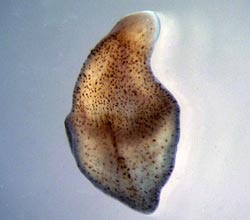Controversial worm keeps its position as the progenitor of mankind

Researchers are arguing about whether or not the Xenoturbella bocki worm is the progenitor of mankind. But new studies, involving swedish researchers from the University of Gothenburg and the Gothenburg Natural History Museum, indicate that this is actually the case. Photo: Hiroaki Nakano <br>
The Xenoturbella bocki worm is a one-centimetre long worm with a simple body plan that is only found regularly by the west coast of Sweden. The worm lacks a brain, sexual organs and other vital organs.
Zoologists have long disagreed about whether or not the Xenoturbella bocki worm holds a key position in the animal tree of life. If it does have a key position, it is very important for the understanding of the evolutionary development of organs and cell functions, such as stem cells, for example. The question is therefore not only important in the field of biology, but also for potential biomedical applications.
“It’s absolutely fantastic that one of the key evolutionary organisms in the animal kingdom lives right on the doorstep of the University of Gothenburg’s Centre for Marine Research. And this is actually the only place in the whole world where you can do research on the creature,” says Matthias Obst from the Department of Biological and Environmental Sciences at the University of Gothenburg.
Genetic studies indicate that the Xenoturbella bocki worm belongs to the group of deuterostomes, the exclusive group to which also man belongs.
“So maybe we’re more closely related to the Xenoturbella bocki worm, which doesn’t have a brain, than we are to lobsters and flies, for example,” says Matthias Obst.
Even though the worm does not particularly resemble man, development biologists have referred to the fact that the early embryonic development of the worm may display similarities with the group to which man belongs. But the problem has been that no one has previously been able to see the development of the creature.
But now a group of researchers at the Sven Lovén Centre for Marine Sciences and the Gothenburg Natural History Museum have succeeded in doing what no one else has done before: to isolate newly born little Xenoturbella bocki worms.
“And these new-born worms revealed absolutely no remnants at all of advanced features! Instead, they exhibit similarities with quite simple, ancient animals such as corals and sponges,” says Matthias Obst.
The studies also reveal the value of the University of Gothenburg’s marine stations for important basic research.
“The Lovén Centre at the University of Gothenburg is the only place in the whole world where you can study this paradoxical animal (in Swedish called ‘Paradox worm’). That’s one reason why researchers come from all over the world to Gullmarsfjorden to solve one of the great mysteries in the evolution of animal life,” says Matthias Obst.
Link to article: http://www.nature.com/naturecommunications
and citable via a digital object identifier (DOI) number 10.1038/ncomms2556
Contact:
Matthias Obst, Researcher, Department of Biological and Environmental Sciences, University of Gothenburg
Tel.: +46 (0)31 7863827, mobile +46 (0)738475003
email: matthias.obst@bioenv.gu.se
Media Contact
More Information:
http://www.gu.seAll latest news from the category: Life Sciences and Chemistry
Articles and reports from the Life Sciences and chemistry area deal with applied and basic research into modern biology, chemistry and human medicine.
Valuable information can be found on a range of life sciences fields including bacteriology, biochemistry, bionics, bioinformatics, biophysics, biotechnology, genetics, geobotany, human biology, marine biology, microbiology, molecular biology, cellular biology, zoology, bioinorganic chemistry, microchemistry and environmental chemistry.
Newest articles

High-energy-density aqueous battery based on halogen multi-electron transfer
Traditional non-aqueous lithium-ion batteries have a high energy density, but their safety is compromised due to the flammable organic electrolytes they utilize. Aqueous batteries use water as the solvent for…

First-ever combined heart pump and pig kidney transplant
…gives new hope to patient with terminal illness. Surgeons at NYU Langone Health performed the first-ever combined mechanical heart pump and gene-edited pig kidney transplant surgery in a 54-year-old woman…

Biophysics: Testing how well biomarkers work
LMU researchers have developed a method to determine how reliably target proteins can be labeled using super-resolution fluorescence microscopy. Modern microscopy techniques make it possible to examine the inner workings…





















